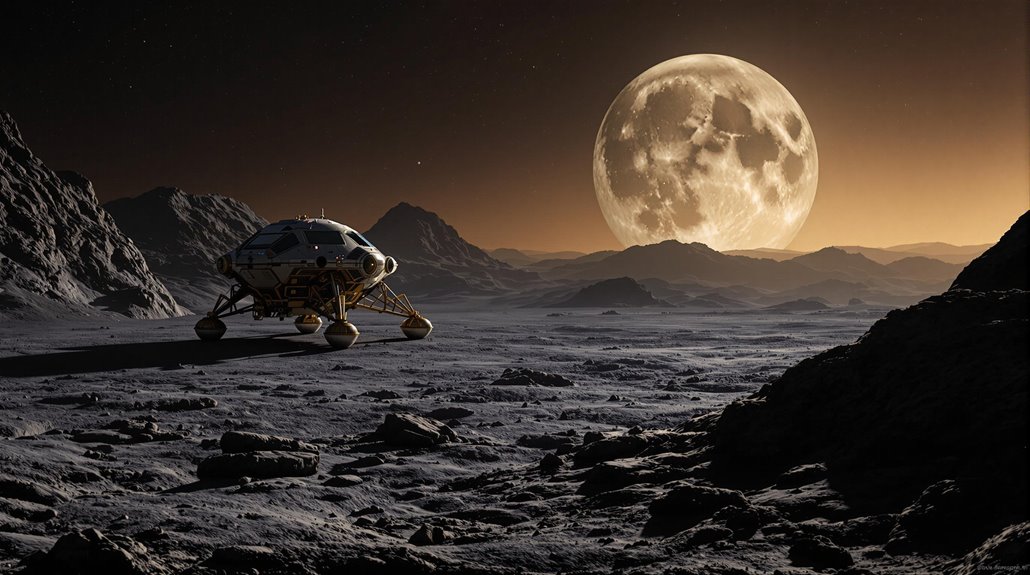He Claimed the Moon: The Man Who “Owned” Earth’s Satellite
Like Columbus staking his claim on behalf of Spain, you might think discovering new territory grants ownership rights. But when Dennis Hope declared himself owner of the Moon in 1980, he wasn't sailing across any ocean – he was reaching for the stars from his living room. You've probably heard about people selling stars, but Hope went bigger, turning lunar real estate into a multi-million dollar venture. The story of his audacious claim raises fascinating questions about who can truly own the celestial frontier.
The Birth of a Lunar Real Estate Empire

When Dennis Hope stumbled upon a potential loophole in the 1967 Outer Space Treaty, he launched one of history's most audacious real estate ventures. You might think claiming ownership of the moon was outlandish, but Hope's lunar sales tactics proved remarkably effective.
In 1980, he established the Lunar Embassy and boldly filed an ownership declaration with the United Nations for the moon and other celestial bodies. His cosmic land valuation started at just $19.99 per acre, making lunar property ownership accessible to everyday dreamers. Each buyer receives personalized deeds and maps showing their specific lunar plot location. Even three former presidents have purchased lunar plots through Hope's company.
Since then, he's sold over 611 million acres to more than 7 million people across 197 countries. The venture has generated millions in revenue, with some investors willing to pay premium prices – like the remarkable $250,000 sale of a 2.66-million-acre plot.
Legal Loopholes and Space Treaties
Hope's ambitious moon-selling enterprise raised serious questions about the legal framework governing outer space ownership. While the Outer Space Treaty prohibits nations from claiming celestial bodies, its legal interpretations regarding private ownership remain unclear.
This ambiguity has created a complex landscape where entrepreneurs like Hope could exploit existing loopholes. The Convention's strict liability principle fails to adequately address modern challenges in space activities.
The lack of international collaboration in updating space laws has led to several challenges:
- No clear enforcement mechanisms exist for treaty violations
- Private property rights aren't explicitly addressed
- Modern commercial space activities weren't considered
- National laws conflict with international treaties
- Dispute resolution procedures are inadequate
You'll find that the current legal framework hasn't kept pace with commercial space ambitions.
The SPACE Act of 2015 and similar laws in Luxembourg and UAE demonstrate how nations are independently interpreting space property rights, further complicating the regulatory landscape.
Inside the Lunar Embassy Corporation
Through clever marketing and dubious legal claims, the Lunar Embassy Corporation emerged as the world's most prominent celestial real estate venture. Founded by Dennis Hope in 1980, the Nevada-based company has generated $11 million selling extraterrestrial investments on various celestial bodies, including the Moon, Mars, and Venus.
You'll find their signature product is a one-acre lunar plot for $19.99 plus fees, complete with ownership deeds and mineral rights. Each purchase includes three authentic documents showcasing property ownership and location.
The company's success stems from targeting both novelty purchases and serious buyers, attracting over 6 million customers from 180+ countries, including three former U.S. presidents. In 2004, Hope established the Galactic Government to serve as a governing body for extraterrestrial property owners.
While some view their offerings as amusing gifts, others consider them legitimate investments. Despite criticism from space law experts who label it a fraudulent scheme, the company maintains its legitimacy through an alleged loophole in the 1967 Outer Space Treaty.
Moon Ownership Through History
Since ancient times, humans have attempted to stake their claim on Earth's only natural satellite.
Moon myths and lunar legends have evolved into actual ownership claims, starting with Prussia's King Frederick the Great supposedly gifting the Moon to the Juergens family in 1756.
You'll find several notable claims throughout history that showcase humanity's desire to possess the Moon:
- Chilean lawyer Jenaro Gajardo Vera declared himself the Moon's owner in 1953
- A. Dean Lindsay tried claiming all extraterrestrial objects in 1936
- Robert R. Coles registered his lunar claim in Chicago's Quietus Registry in 1954
- James T. Mangan established the Nation of Celestial Space in 1955
- Dennis Hope started the Lunar Embassy Corporation in 1980
These ambitious claims were eventually challenged by international space law, particularly the 1967 Outer Space Treaty, which defined the Moon as the "province of all mankind." The treaty explicitly states that no nation can claim sovereignty over any celestial body. Modern lunar land certificates, like those sold by Dennis Hope's company starting at $24.99 per acre, continue to be sold despite lacking any legal validity.
The Future of Space Property Rights

While past moon ownership claims may seem whimsical today, the modern landscape of space property rights presents complex legal and commercial challenges.
As private companies rush to develop lunar mining operations and tourist facilities, you'll find the need for clearer space governance becoming increasingly urgent.
The current framework, built around the Outer Space Treaty and Artemis Accords, struggles to address emerging commercial interests in extraterrestrial assets. The Liability Convention ensures nations remain accountable for any damages their space objects may cause.
You're witnessing a transformation as nations and corporations navigate this uncertain territory.
The future may bring international property registries, space-based arbitration systems, and extensive resource-sharing agreements.
What's at stake isn't just lunar real estate, but the foundation for humanity's expansion into space.
The decisions made today about property rights will shape how we explore, settle, and utilize space resources tomorrow.










